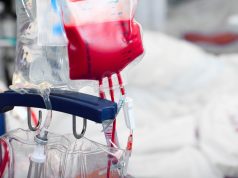Potentiated reward tied to response in areas critical for reward valuation, including dorsal striatum
THURSDAY, June 14, 2018 (HealthDay News) — Foods containing fat and carbohydrate are more highly valued than those with only fat or carbohydrate, and this potentiated reward is associated with response in brain areas critical for reward valuation, according to a study published online June 14 in Cell Metabolism.
Alexandra G. DiFeliceantonio, Ph.D., from the Max Planck Institute for Metabolism Research in Cologne, Germany, and colleagues used an auction task in which participants bid for snacks depicted in photographs, concomitant to functional magnetic resonance imaging scanning, in order to compare the willingness to pay for fat + carbohydrate versus fat or carbohydrate foods.
The researchers found that participants were willing to pay more for fat + carbohydrate versus equally familiar, liked, and caloric fat or carbohydrate foods. This potentiated reward correlated with response in areas of the brain that are critical for reward valuation, including the dorsal striatum and mediodorsal thalamus. Individuals were better able to estimate the energy density of fat versus carbohydrate and fat + carbohydrate foods. This effect correlated with functional connectivity between the fusiform gyrus and ventromedial prefrontal cortex (visual and valuation areas).
“These results provide the first demonstration that foods high in fat and carbohydrate are, calorie for calorie, valued more than foods containing only fat or carbohydrate and that this effect is associated with greater recruitment of central reward circuits,” the authors write.
Copyright © 2018 HealthDay. All rights reserved.








